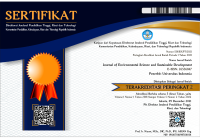Abstract
In Indonesia, there are classic issues about waste that are highlighted due to the country’s critical conditions. Uncontrolled population growth and regional development have led to massive waste production. One popular practice in waste management is located at integrated waste management site (TPST). This practice has been implemented successfully by TPST Mustika Iklhas, a small community operation in Tangerang. Though different from previous operations, its success is achieved by active community participation, far away from government intervention. This study looks at management practices in TPST Mustika Ikhlas. The method used to address real and complex problems is called system dynamics. This method uses life cycle thinking to address the waste management practice in Mustika Residence. Once the model was constructed, a simulation was carried out within 1,080 days. In this study, exponential behaviors were generated in the main variables such as waste, inorganic waste, and compost. However, organic waste exhibited oscillation behavior due to its processing time needed to convert to compost. From the results and discussion, we conclude that integrated waste management in TPST Mustika Ikhlas has been effective in reducing waste through conversion to inorganic waste and compost. Intervention to Business-As-Usual (BAU) should focus on two leverage variables: retribution and TPST cash flow.
Recommended Citation
Johannes, Hendro Putra
(2018).
WASTE REDUCTION THROUGH INTEGRATED WASTE MANAGEMENT MODELING AT MUSTIKA RESIDENCE (TANGERANG).
Journal of Environmental Science and Sustainable Development, 1(1), 12-24.
Available at: https://doi.org/10.7454/jessd.v1i1.15






